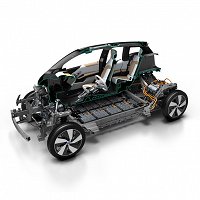Lightweight construction is essential
11.04.2018
Lightweight construction generally pays off because more weight always equals higher energy consumption. Lightweight construction can also be inexpensive and improve competitiveness.
Lightweight construction pays off in every respect: More weight always equals higher energy consumption — depending on the vehicle type and driving cycle, the consumption of an electric vehicle increases by up to 1 kWh per 100 kilometers per 100 kilograms of additional weight. By implication, this means that a lighter and more fuel-efficient basic vehicle equipped with the same size of battery has a correspondingly higher range or reaches the same distance with a smaller battery (less cost).
The reason for this: Higher mass equaling higher recuperation of the braking energy is an overrated factor. According to experts, recuperation will increase the range of a less efficient electric car by just 10 to 15 %.
The main issue with lightweight construction is still the cost of materials such as aluminium or carbon, which are more expensive than sheet steel. But lightweight construction can also be inexpensive, enhance competitiveness and significantly improve the end customer benefit. However, achieving these goals requires a holistic, systemic lightweight construction approach: planned and developed beyond individual vehicle modules. In the past, developers were more inclined to take the material as a starting point, but today they are tackling lightweight construction in an integrative way," explains Rainer Kurek, Managing Director of Automotive Management Consulting GmbH, and mentions hybrid lightweight design as a further trend: "We have to think very carefully about how the respective materials can be used in a way that conforms to their strength. For example, composites can absorb tensile forces very well, while metals are more widely used if compressive forces have to be compensated."
Rethinking lightweight construction
Against the backdrop of the current megatrends of electromobility, connectivity and automated driving, management performance is becoming an increasingly important topic in the high-tech automotive industry. Today, managerial effectiveness is more important than ever. This also applies to lightweight automotive construction, which is also characterised by many new challenges, initiatives and ways of thinking. Additive manufacturing processes, bionic optimisation approaches and function-oriented process technologies are currently shaping various development and production trends — always focusing on time and cost efficiency.
In his speech at the "Automobil Industrie”-Lightweight Construction Summit, Rainer Kurek presented several new ideas, which were discussed by experts during the subsequent panel discussion. In his "lightweight navigator", Kurek combines different scopes and perspectives of lightweight construction in a systemic management model — this model represents strategic, process-related and structural correlations.
Source:
"This article has been taken from ETMM - European Tool & Mould Making: www.etmm-online.com"














































